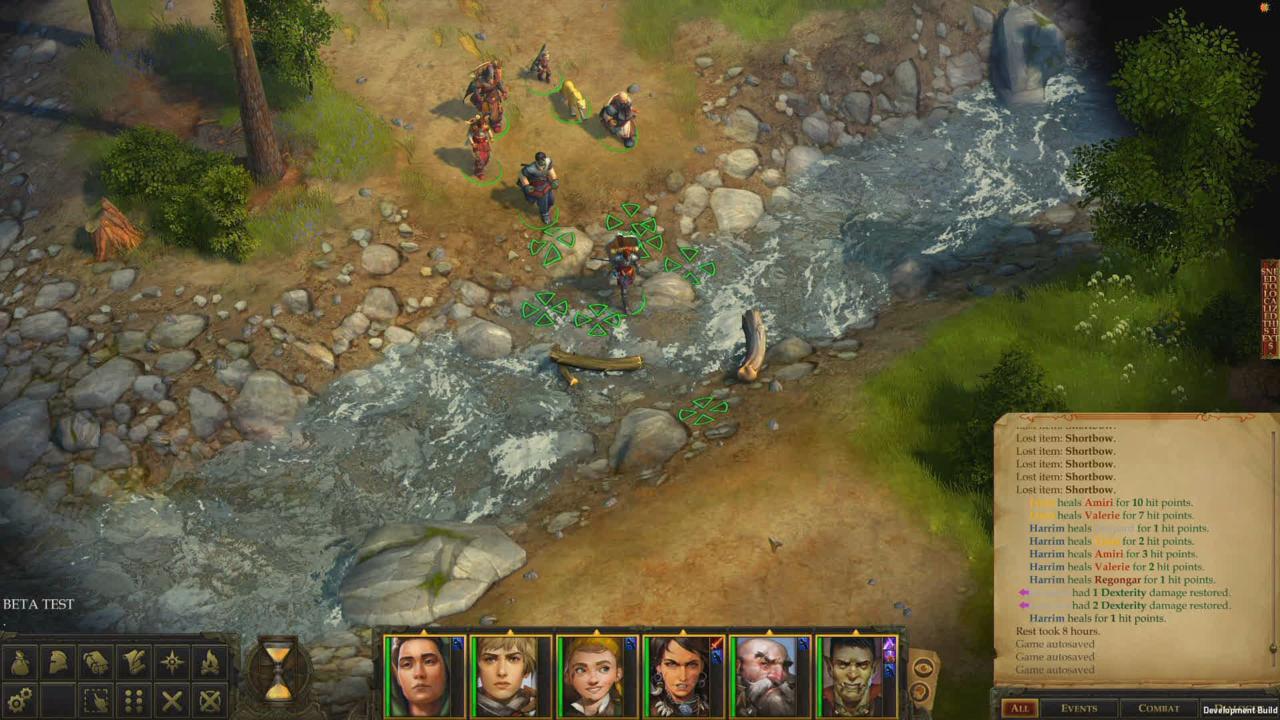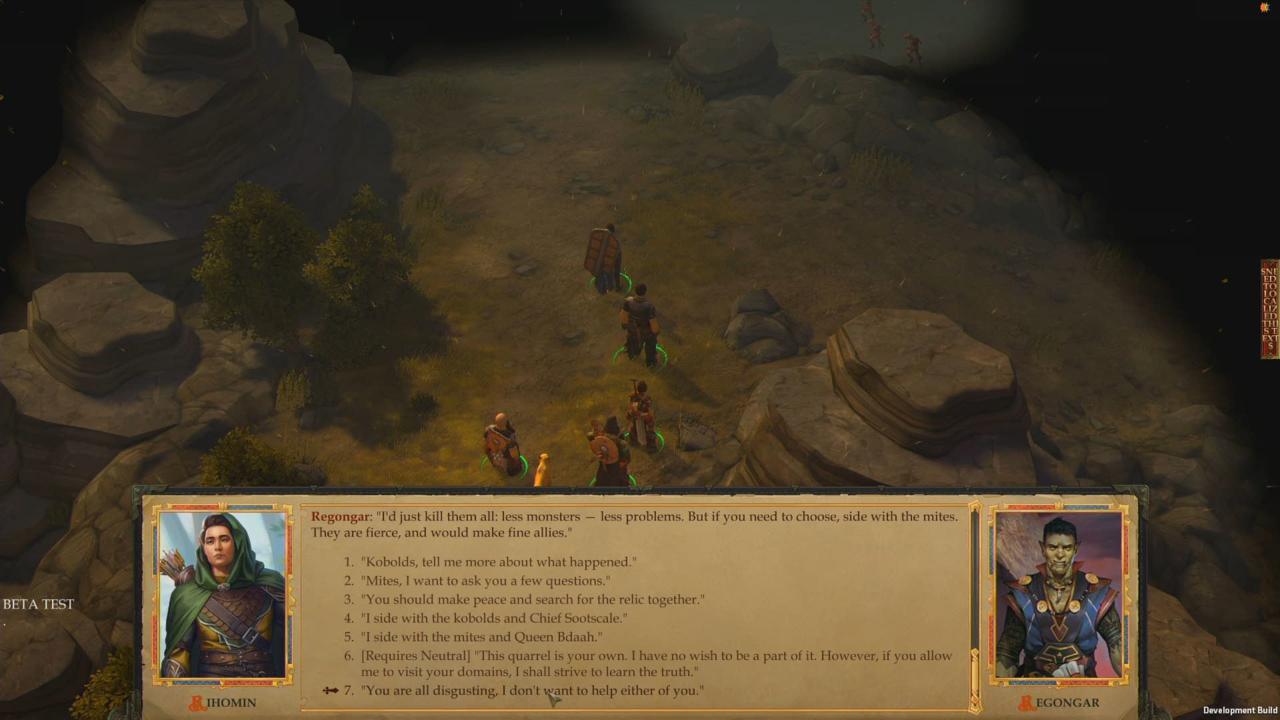Pathfinder is a household name for those familiar with world of role-playing games, but the uninitiated should know that the franchise has been a marvel in the tabletop space. With Pathfinder: Kingmaker, the series makes its video game debut--it's based on the Kingmaker module using Dungeons and Dragons rulesets from its tabletop counterpart. But since this is a single-player RPG, Pathfinder would need a robust narrative to bring its world to life, which is why developer Owlcat Games teamed up with one of gaming's great storytellers, Chris Avellone.
Avellone has written and designed some of the most critically acclaimed games and memorable stories; from Obsidian's Star Wars: Knights of the Old Republic II - The Sith Lords and Fallout: New Vegas to CRPG classics like Planescape: Torment and Icewind Dale. More recently, he's worked on Prey and Into The Breach, and is currently working on the System Shock remake as well as Dying Light 2, serving as narrative designer. During a Pathfinder: Kingmaker hands-on session, we were able to chat with Avellone about designing an expansive story for the Pathfinder franchise and staying true to the source material.
As an isometric RPG in the vein of Baldur's Gate games, Pathfinder: Kingmaker weaves in elements from the original tabletop experience, especially as it relates to traveling across the Stolen Lands. You can experience it yourself when the game launches for PC and Mac on September 25, 2018. The following interview was edited for clarity and readability.
You've worked with established IPs, Star Wars: Knights of the Old Republic II and Fallout: New Vegas for example. What exactly drew you to Pathfinder, and how different is it working on this game compared to others?
Chris Avellone: So, with Pathfinder, we used to run pen-and-paper sessions back at Obsidian, and what we did was actually have a campaign in an Ocean's Eleven-style. It was really cool! We just made an assortment of characters like a con-man illusionist and we try to pull off heists. That was the most recent Pathfinder game I played. I also played the card game, which I also loved. Just the idea of being able to do this really interested me because there hadn't really been a Pathfinder RPG in the computer space at all.
The other aspect was one thing I've always liked about Pathfinder. I feel that when they do their modules and adventure paths, they make a very conscious effort to create an other-world experience. When I read one of their adventures, rather than just seeing what they're giving me, I'm seeing all the possibilities they present the GM [Game Master], too. So, reading those adventures is sometimes a lot more fun than reading some older modules or other adventures for other systems, because it's giving you room to breathe.
With Pathfinder, we used to run pen-and-paper sessions back at Obsidian, and what we did was actually have a campaign in an Ocean's Eleven-style. It was really cool! We just made an assortment of characters like a con-man illusionist and we try to pull off heists.

Pathfinder, and D&D in particular, is a different type of this high-fantasy, but coming off of Prey and Into The Breach, how have lessons from very different games fed into what you're doing with Pathfinder? What are you taking from your previous works and how have they influenced Kingmaker?
Well, one aspect is the computer game pays a lot of attention to character growth. Not just your stats, but also the alignment system. And the lesson I'm taking from previous titles--like in Fallout: New Vegas with the whole idea of karma and Planescape: Torment with the alignment tracking where you basically start true neutral and you grow in all directions--using the tracking systems from previous games like that, and being able to "check" it in dialogues and "check" it for certain events happening. Like "hey, here's your true mutual response," or "here's the way a chaotic evil character could solve this situation."
It's more of a matter of having been through that process so many times, I know pretty efficient ways to track alignment shifts. Also, how to make each of those alignments feel satisfying, because one challenge that can happen is--and you run into this problem with Fallout 2--sometimes the mistake you can make is you actually create a path of growth for a character, and then you can accidentally design a dead end around it. Like in Fallout 2, if you were evil and a slaver, you suddenly lose a huge percentage of content for the game because no one would talk to you and quests would get cut off.
You have to make sure if you're providing the chaotic evil options, like in Pathfinder: Kingmaker, you also want to make that character arc satisfying, too. Because if that's the way a player wants to play, make an interesting path and go in that direction.
That also makes me think of how difficult it is to build specific character arcs. For example, in Fallout: New Vegas, I was straight up aligned with NCR. I didn't want anything to do with Caesar's Legion.
Yeah, they have a lot of bad traits!
To say the least! What's it like to build an entire narrative, write all these stories, but know that a lot of people are going to miss out on a big chunk of your work? Is there ever a point which you think, "I want to make sure they're able to see everything," or is it always, "I know going into this that not everyone's going to see everything?"
Yeah, it's the latter of what you just said. I've always been comfortable with having players missing elements. I don't like to mandate a story on someone. For example, as you're exploring the cavern complex in Pathfinder, the way I try and design an area like that is--because you're paying attention to the map and the floor of the dungeon--to be able to visually tell the story and tell it with things that are really hard to escape. If I really need to get something across, I'd use techniques like that.

Overall, I think what's kind of cool is if you're playing a chaotic evil character, someone else plays lawful good, and then you guys talk about the game. Then suddenly you're like, "Yeah, I like trolls in my kingdom. They're like the best armed forces I've ever had," and the lawful good guy's like, "What? You're allowed to do that?" I'm like, "Yeah, it's pretty cool. I wiped out that enemy army" and he's like, "I had a hell of a time with that enemy army!"
I'm cool with that because if everyone did see everything, everyone's story is kind of the same. I think a lot of the role playing joy is when you're exploring that, you get an individual experience with the role playing.
One thing I wanted to mention is that I tend to feel Obsidian went in darker directions. I felt that when you got to work with the Star Wars license and Fallout. In those cases, it seemed like you had a lot of creative freedom to take it in a direction you want. What's that like, the process in which you get a license and start to build it out? Is the response, "hey, source materials right here, have fun with it?"
The way we approach it is, when you have a franchise, you sort of want to immerse yourself in it actually before you do any heavy lifting with the tighter plot. You're like, "Okay, what are the stories that have already been told? What's the feel of this franchise?"
After you read like 30, 40, 300 books, you have the mindset. The same thing's true with Star Wars. When we were doing Star Wars, I read all the Young Jedi books, I watched all the movies again, I watched the Star Wars Christmas special. Once you get all that information, it's all in your head. You're like, "Okay, well, now when I propose stuff to LucasArts, I have this background and I know everything a specific character did." And the best part is when you can propose those ideas.
We know the license, they'll respect you more and they have fewer questions about what you submit to them. I think we got five or six comments in the KOTOR 2 storyline, and that's because we just took the time to make sure that we'd done our research on the license.
Like in KOTOR 2, there was one example. We have this companion that was a Wookie slaver, and that's unusual. Our producer pushed back and he was like, "I'm sorry, that's just completely inconsistent with the franchise. Wookies just aren't slavers, they're enslaved all the time." and I'm responded, "Well, in Young Jedi book #13, there's a whole character arc involving this one Wookie as a slaver." The producer went quiet and was like, "All right, I guess it's approved."
But we have that information, we know the license, they'll respect you more and they have fewer questions about what you submit to them. I think we got five or six comments in the KOTOR 2 storyline, and that's because we just took the time to make sure that we'd done our research on the license. And if there was ever an issue, we could discuss it and make our case. They're like, "Well, we just trust you now." It's cool.
You've done a lot of work over the years, but are there any particular characters you've written that you're absolutely proud of, or would call a favorite?
Actually, a certain character for Pathfinder: Kingmaker was a lot of fun to write, and I'm really kind of curious to see how he's received because I've never been able to write sort of a very cunning goblin-esque character. The trick in Pathfinder is that the goblins are so different than normal fantasy goblins, that was kind of a treat to write. But yeah, it was fun to do the comedic moments, but it was also to do the serious moments. The fact that you're sort of acting as this goblin's mentor and he's trying to mentor you in his own weird way, that was a lot of fun to write! So, I'm curious to see how people receive him.





















